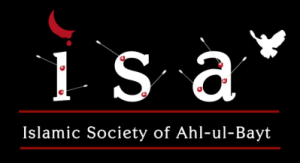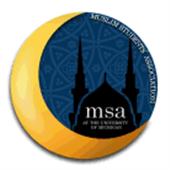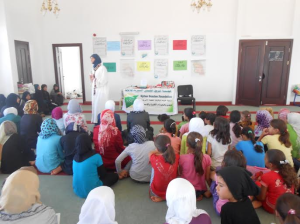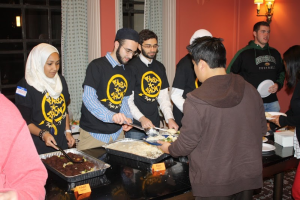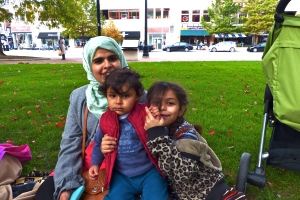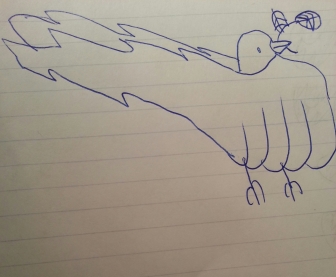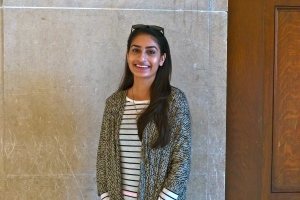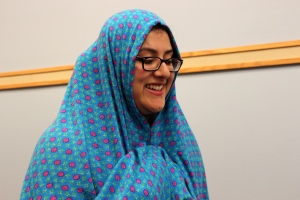Dawah open spaces notes
Imam Saleem Khalid said that Battle Creek was one of the cities he competed with competitively. He spent a lot of time between Kalamazoo and Battle Creek. Then he want to Grand Rapids for a scholarship for GM which is now Kettering. He hated Grand Rapids and hated GM and went to Detroit in 1971. He met Muslims on campus at Wayne State and he was a devout Christian. He was raised in a baptist church. Wanted to be a theologian but didn’t understand the holy trinity. Backed up from Christianity and ran into Muslims. People answered his questions and that’s why he loves to respond. People were kind enough to respond to him. He lives in Canton now but he lived in Detroit 2010 and moved to Virginia to work for Islamic relief. He doesn’t claim to be an expert on Dawah, but a couple of years of experience has served him well to have a discussion. Sitting down and helping people understand a sound belief in Islam is time consuming. You can get people to the water fountain which is Allah and the prophet because Allah touches their heart but we can help facilitate their journey to the waterfall. He was the first of his family to become Muslim. Then his mom and dad converted before they passed away.
He wants the opportunity to share what we have and what we believe in. There are people shaken by events of media.
Chris – if you can take care of a new Muslim, that’s the best Dawah you can do because they’ll bring in new people. The trickle of people who become Muslim is 50,000. If we were taking care of these people, there would be more than 50,000. 1/4 women get abused, that’s not right. We undervalue how amazing Islam is. It’s beautiful.
We like the warm moments with the invigorating stories. It’s miraculous that Allah guides people.
How do we go about Dawah?
Chris- I don’t care what Isis does. I don’t care what you think Islam is. Have confidence in yourself and religion. Mohammed Ali and Malcolm X. Islam is beautiful. If people sit with Muslims they’ll love it. It’s pretty awesome to be Muslim
Imam Saleem Khalid- there is a humble swagger we need to embrace but before that we need to develop a relationship with our creator Allah (swt) understand what he is expecting from us. Humble ourselves and accept what he has asked us to. It literally gives us a sense of self and confidence that allows us to forge through the irrespective day around us. People develop disdain without knowing us or Islam, and we allow others to paint our reality for us. People don’t hate you around the world. This is a script we are allowing people to right for us and around us. We have to fight this- this perception that it’s us against them and that they don’t like us. We have to be the people who become the example of what Islam is. The American public is engaged with a lot of things, they’re not thinking about Isis and Muslims, they’re thinking about chips and football and work and kids and the electric bill. We are humans a part of the human experience and we can allow this to overwhelm this. Our perception of what people and society are thinking about us drives us in terms of interaction and lack of interaction. Dawah is individual examples of people acting one on one.
Example, young white American convert from Westland and works for Pepsi. He was divorced with one child at State. He said he never wants to get married again. Became Muslim and is ready to be Muslim and married a women from buffalo originally from Yemen. Concert just over a year and a year and a half. His love for Islam is unbelievable. White American and body builder and has Islamic swagger. He wears a beard and is like what! He says it’s fascinating how his peers deal with him. They pick him apart one by one and he couldn’t contain himself. One guy asked him if that was his wife, is she Muslim. So you’re married to a Muslim? Yeah. It’s okay come on. Your Muslim? Yeah. That set the stage for conversations that just continued to go on. Can we have coffee together I have a guy at work who is interested in Islam? If we see ourselves as having something to offer, it’ll be a tremendous affect. Islam, you have a gift and you have a right to let others know. Don’t be arrogant, be patient, be humble but give people a chance and people are going to ask you questions. Let them.
How do we know when to stop?
Imam Saleem Khalid- it a real conversation. No one ever asks when do we stop. We feel our way through it and stumble through things. He went home after his Shahada and he comes from a family of big people in a small house. It’s like the clowns. He was so excited about being Muslim even though he knew nothing really. He walked in with a swagger that was unbelievable. Mom what’re you cooking? We can’t eat that. His dad was so big, shoulders and height. He came out and said how ya doing, sit down, catch your breath and sit down. remember – my house, my wife, my meal. His father was so reluctant to even sit and engage in a convo about Islam. He wouldn’t do anything, paint masjid and take things to masjid but never went in to a masjid until the day of his Janazah. He wasn’t good enough to enter the harrowed halls of Islam. It’s a human interaction/conversation, you may not talk enough or stumble but you’ll be fine.
When you engage in these conversation, you make it sound natural, but when you don’t know the answer how do we address those?
Alaa- best policy is I’m not qualified to answer this but I can try and find out.
Guy- Best response to a question you don’t have the answer for is I don’t know. That doesn’t devalue the reality of deen. It answers the question. He doesn’t feel he knows anything 40 years into this. Teachers aren’t just people who have degrees. Tariq Ramandan, he has tremendous amount of respect for him. One of his sheiks was a drug addict and eventually died but he was his sheikh because there was something to learn from that man’s experience. We ask questions.
Chris- understand why they’re asking the question.
Saying idk sounds like you’re evading it or you have itty bitty details. There’s a reason why they’re asking these tough questions.
If you have a chance to go back in time to campus, what would you differently in terms of Dawah?
Imam Saleem Khalid- figure out a way to gather and facilitate people. The ultimate objective is to please Allah (swt)
Begin to look around us and see if there are things we can attach ourselves to and be involved in that allows some type of interaction. We have something to give, we have rights and responsibilities. Open eyes and encourage to see what is going on around us.
Chris explains that Tayssir says hi to both the administrator and janitor of the Union. This is Islam at it’s finest to Imam Saleem Khalid. Mohammed Ali was invited to a fundraiser and he sat next to him. He was in his early stage of Parkinson’s. He used to be able to talk a million miles a minute. He engaged in a verbal and non verbal conversation. When it ended, every Muslim went up to him and wanted to take a picture. This man is sick. Doesn’t speak a lot. People told him to go and it’s already an hour past. He said no he told his people to come close and he told them go back and get all of the people that have waited on these tables and washed the dishes and bring them out. He watched the people carry out the food and clear and carry the tables and he watched people peeking trough the doors– at least 40 people. Next hour and a half he sparred with the men took kissed from the women and took pictures with them. Never once said I am Mohammed Ali and I am sick and tired. Talk about Dawah. He gave them his time and his energy, the little that he had. Stop and put things in perspective. People love the prophet. Even the people who disliked his message, this is the best of people. He’s honest, kind to his neighbors and families, trustworthy and a great personality. It’s not about what we say American people are observers and they are innovative with Dawah– call them to adultry, debauchery, etc. we’re trying to call them to Islam. They’re gonna watch they’re not stupid. You’re greatest Dawah is you. Your greatest Dawah is your example. How many people have you brought to Islam? Not a soul. It wasn’t a result if me it was a result of Allah. There’s no one thing to turn the light on or light off. We don’t have an idea of the power of dua. He begged Allah for his mom and dad to convert and he responds. Allah Responds. Have confidence in Allah. We rely on him. There is a prophetic modem/user’s manual.
Sometimes during Dawah we fall into secular culture and denounce shariah law?
When we engage with other communities, we emphasize our similarities and not our differences. How do we do this?
Chris-an American someone was critiquing justice. Learning and confidence. Chris was a zealous concert, capris before they were popular. Guy in engineering became his BFF he was a doubt Filipino catholic. Good guy. Didn’t drink. Hard working. Married his girlfriend. Never asked about Islam. Senior project was going to be him and other guy and Muslim brown friend. Watch them pray together. John and Aiman asked brown friend about Islam. Chris was like what’re you talking about?? They never ask me. Maybe I had been too out there.
Saleem-Khalid A woman was going to take shahada but a lady said she needed to divorce her husband and she said no. Her husband walks in late at 11/- she’s thinking of the worst things. He felt a call to go in the masjid and people talked to him and he took I his shahadah before her. She was going to take it the next morning
Wanna talk about justice??? Let’s talk about the pedophile you put in jail and release with no rehab? He commits the same crime and is put back on jail? Let’s talk about a justice system. Yours is a joke.
Hold on America. You hung people, put gas on them and burned them. His grandma is Cherokee. You took the indigenous people and took their land and resources and turned them into alcoholics. Don’t lecture me. Let’s all be humble.
